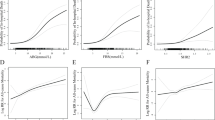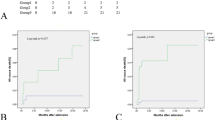Abstract
Purpose
In this study, we analyzed the effect of stress hyperglycemia on patients admitted with diabetes mellitus. The effects of glycated hemoglobin (HbA1c) on left ventricular function and inflammatory factors in these patients with diabetes mellitus and myocardial infarction undergoing percutaneous coronary intervention (PCI) were also studied.
Methods
The clinical data of 160 patients with diabetes mellitus and myocardial infarction treated with PCI over the period of December 2018 to June 2020 were retrospectively analyzed. The patients were divided into groups A (38 cases), B (40 cases), C (43 cases), and D (39 cases) according to their blood glucose (AG) and HbA1c levels upon admission.
Results
The levels of FGB, 2hPG, and HbA1c in group B after PCI were significantly higher than those in groups A, C, and D (p < 0.05). After PCI, group B showed significantly higher levels of LVESD and LVEDD and significantly lower levels of LVEF than other groups (p < 0.05). The levels of TNF-α, IL-6, and CRP in group B after PCI were significantly higher than those in other groups (p < 0.05). The incidence of endpoint events was higher in group B (35.00%) than in the other three groups (p < 0.05). Multiple logistic regression analysis indicated that high AG and HbA1c levels were the main risk factors for adverse prognosis (p < 0.05). AG and HbA1c were positively correlated with LVESD, LVEDD, TNF-α, IL-6, and CRP levels, and negatively correlated with LVEF levels (p < 0.05).
Conclusions
In summary, in patients with diabetes mellitus combined with myocardial infarction and undergoing PCI on admission, stress hyperglycemia and high HbA1c levels were associated with higher FGB and 2hPG levels, which exacerbate ventricular functional impairment and inflammatory response, increase the risk of endpoint events, and can be predictors of patient prognosis.



Similar content being viewed by others
References
Lopez-de-Andres A, Jimenez-Garcia R, Hernández-Barrera V, de Miguel-Yanes JM, Albaladejo-Vicente R, Villanueva-Orbaiz R, Carabantes-Alarcon D, Zamorano-Leon JJ, Lopez-Herranz M, de Miguel-Diez J. Are there sex differences in the effect of type 2 diabetes in the incidence and outcomes of myocardial infarction? A matched-pair analysis using hospital discharge data. Cardiovasc Diabetol. 2021;20:81.
Rashdi A, Ali J, Ahmed A, Shahzad S, Shahzad K, Usman A. Frequency of unidentified diabetes mellitus in patients with acute myocardial infarction. PAFMJ. 2020;70:S731–6.
Sardu C, Modugno P, Castellano G, Scisciola L, Barbieri M, Petrella L, Fanelli M, Macchia G, Caradonna E, Massetti M, Paolisso G, Marfella R. Atherosclerotic plaque fissuration and clinical outcomes in pre-diabetics vs. normoglycemics patients affected by asymptomatic significant carotid artery stenosis at 2 years of follow-up: role of microRNAs modulation: the ATIMIR Study. Biomedicines. 2021;9:401.
Butcher SC, Lustosa RP, Abou R, Marsan NA, Bax JJ, Delgado V. Prognostic implications of left ventricular myocardial work index in patients with ST-segment elevation myocardial infarction and reduced left ventricular ejection fraction. Eur Heart J Cardiovasc Imaging. 2022;23:699–707.
Hollister-Meadows L. Case report: transient stress hyperglycemia in the patient with st-elevation myocardial infarction. J Nurse Pract. 2022;18:245–7.
Paolisso P, Foà A, Bergamaschi L, Angeli F, Fabrizio M, Donati F, Toniolo S, Chiti C, Rinaldi A, Stefanizzi A, Armillotta M, Sansonetti A, Magnani I, Iannopollo G, Rucci P, Casella G, Galiè N, Pizzi C. Impact of admission hyperglycemia on short and long-term prognosis in acute myocardial infarction: MINOCA versus MIOCA. Cardiovasc Diabetol. 2021;20:192.
Cui CY, Zhou MG, Cheng LC, Ye T, Zhang YM, Zhu F, Li SY, Jiang XL, Chen Q, Qi LY, Chen X, Yang SQ, Cai L. Admission hyperglycemia as an independent predictor of long-term prognosis in acute myocardial infarction patients without diabetes: a retrospective study. J Diabetes Investig. 2021;12:1244–51.
Ferreira JA, Baptista RM, Monteiro SR, Gonçalves FM, Monteiro PF, Gonçalves LM. Admission hyperglycemia and all-cause mortality in diabetic and non-diabetic patients with acute myocardial infarction: a tertiary center analysis. Intern Emerg Med. 2021;16:2109–19.
Diabetes Branch of Chinese Medical Association. Chinese guidelines for the prevention and treatment of type 2 diabetes (2017 edition). Chin J Diabetes. 2018;10:64–7.
Chinese Physicians Association of Chinese and Western Medicine Physicians Branch. Expert consensus on the combined Chinese and Western medicine treatment of acute myocardial infarction. Chin J Integr Med Cardio-/Cerebrovascuiar Disease. 2014;6:641–5.
Vasudevan S, Rajendran S. Thermal stress induced hyperglycemia in the blue swimmer crab, Portunus pelagicus. J Therm Biol. 2021;100:103076.
Fan J, Liu LY, Liu XZ. Hyperinsulinemia negatively affects the association between insulin resistance and blood pressure. Nutr Metab Cardiovasc Dis. 2021;31:3359–66.
Gunawardena H, Silva R, Sivakanesan R. Insulin resistance and dyslipidemia predicts the antioxidant status of individuals with type 2 diabetes mellitus. Conference: IDF World Diabetes Congress 2019. At: Bunsan Korea. 2021.
Piątkowska-Chmiel I, Gawrońska-Grzywacz M, Popiołek Ł, Herbet M, Dudka J. The novel adamantane derivatives as potential mediators of inflammation and neural plasticity in diabetes mice with cognitive impairment. Sci Rep. 2022;12:6708.
Li X, Chen Z. Correlation between serum levels of C-reactive protein and neonatal pneumonia: a protocol for systematic review and meta-analysis. Medicine (Baltimore). 2021;100:e25977.
Ghaemi F, Firouzabadi FD, Moosaie F, Shadnoush M, Poopak A, Kermanchi J, Abhari SMF, Forouzanfar R, Mansournia MA, Khosravi A, Mohajer B, Ramandi MMA, Nakhjavani M, Esteghamati A. Effects of a Mediterranean diet on the development of diabetic complications: a longitudinal study from the nationwide diabetes report of the National Program for Prevention and Control of Diabetes (NPPCD 2016-2020). Maturitas. 2021;153:61–7.
Li P. Role of Sestrin2 in thrombosis of type 2 diabetes. Chin J Biol. 2021;34:1520–3. 1528
Vergallo R, Lombardi M, Betti M, Ricchiuto A, Maino A, Buonpane A, Bianchini E, Galli M, D’Amario D, Montone RA, Leone AM, Aurigemma C, Romagnoli E, Buffon A, Burzotta F, Trani C, Crea F. 103 Coronary plaque healing and diabetes: insights from optical coherence tomography imaging. Eur Heart J Suppl. 2021;23:suab140.029.
Gu QL, Jiang P, Ruan HF, Tang H, Liang YB, Ma ZF, Zhan H. The expression of oxidative stress genes related to myocardial ischemia reperfusion injury in patients with ST-elevation myocardial infarction. World J Emerg Med. 2022;13:106–13.
Pereira JL, de Castro MA, Leite JMRS, Rogero MM, Sarti FM, César CLG, Goldbaum M, Fisberg RM. Overview of cardiovascular disease risk factors in adults in São Paulo, Brazil: prevalence and associated factors in 2008 and 2015. Int J Cardiovasc Sci. 2022;35:230–42.
Włodarczak A, Łanocha M, Szudrowicz M, Barycki M, Gosiewska A, Kulczycki JJ, Lesiak M, Doroszko A, Rola P. The 1-year safety and efficacy outcomes of Magmaris, novel magnesium bioresorbable vascular scaffolds in diabetes mellitus patients with acute coronary syndrome. J Clin Med. 2021;10:3166.
Yuan D, Jiang P, Zhu P, Jia S, Zhang C, Liu Y, Liu R, Xu J, Tang X, Zhao X, Gao R, Yang Y, Xu B, Gao Z, Yuan J. Prognostic value of fibrinogen in patients with coronary artery disease and prediabetes or diabetes following percutaneous coronary intervention: 5-year findings from a large cohort study. Cardiovasc Diabetol. 2021;20:143.
Park J, Park S, Kim YG, Ann SH, Park HW, Suh J, Roh JH, Cho YR, Han S, Park GM. Pre-existing depression in patients with coronary artery disease undergoing percutaneous coronary intervention. Sci Rep. 2021;11:8600.
Availability of data and material
My manuscript has no associated data.
Code availability
Not applicable
Author information
Authors and Affiliations
Contributions
YYZ wrote draft. YYZ and JW designed the study and reviewed the manuscript. TH and QHY collected the data. QZ and XD performed the statistical analysis. All authors read and approved the final manuscript.
Corresponding author
Ethics declarations
Ethics approval
This study was approved by the Ethics Committee of Panzhihua Central Hospital.
Consent to participate
The research objects and their families were informed and they signed a fully informed consent form.
Consent for publication
Not applicable
Conflict of interest
The authors declare no competing interests.
Additional information
Publisher’s note
Springer Nature remains neutral with regard to jurisdictional claims in published maps and institutional affiliations.
Rights and permissions
About this article
Cite this article
Zhang, Y., Wu, J., Huang, T. et al. Effect of stress hyperglycemia on admission and glycosylated hemoglobin on left ventricular function and inflammatory factors in patients with diabetes mellitus combined with myocardial infarction undergoing PCI. Int J Diabetes Dev Ctries 43, 412–418 (2023). https://doi.org/10.1007/s13410-022-01090-3
Received:
Accepted:
Published:
Issue Date:
DOI: https://doi.org/10.1007/s13410-022-01090-3




